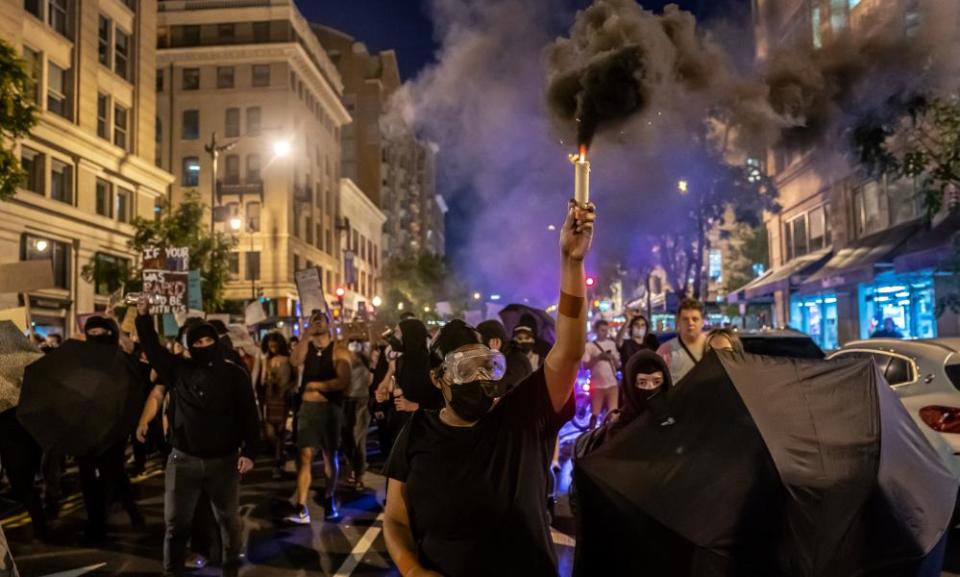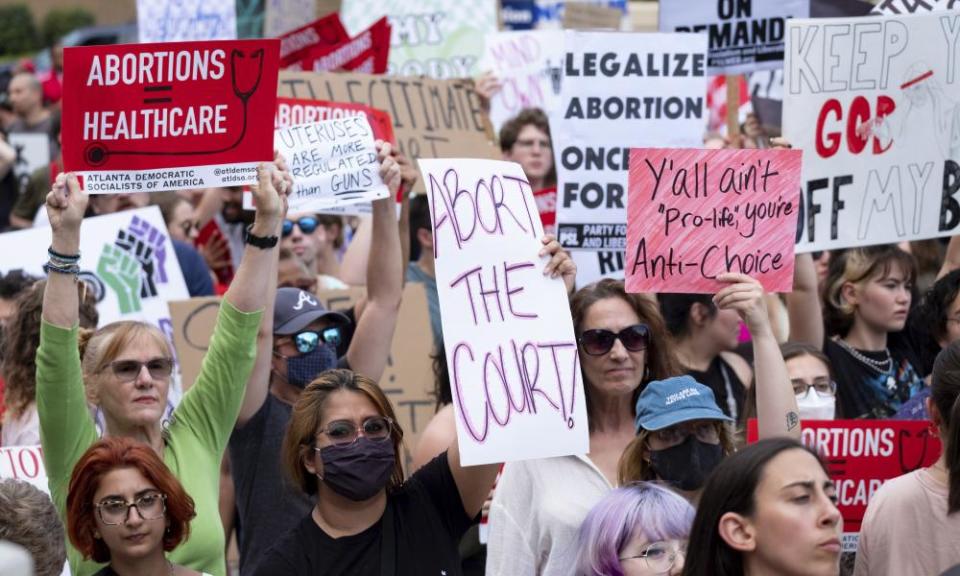‘It’s important to fight’: US cities erupt in protest as Roe v Wade falls

Massive protests swept across the US in response to the supreme court decision overturning the constitutional right to abortion.
Soon after the decision was released on Friday, reversing federal reproductive protections that have been in place for half a century, pro-choice demonstrators began gathering in major cities and smaller towns in a wide range of communities and regions.
Related: Contraception, gay marriage: Clarence Thomas signals new targets for supreme court
In addition to the large demonstration outside the supreme court in Washington DC – where activists shouted, “This decision must not stand! Legal abortion on demand!” and “We won’t go back!” – protesters rallied in New York City, Los Angeles, Chicago, Austin, Houston, Nashville, Kansas City, Topeka, Tallahassee, Miami, Oklahoma, Boise, New Orleans and Detroit. Solidarity protests also erupted overseas in London and Berlin.
In Arizona, people protesting the decision in Phoenix were sent fleeing when police fired tear gas from the state capitol building after demonstrators banged on the doors of the senate, according to eyewitness reports.
NOW This is what's going on outside the Arizona State Senate building: tear gas fired at people on Capitol mall protesting Roe decision. Tear gas fired from windows of the Old Capitol building. https://t.co/sfCm5xpYRd
— Brahm Resnik (@brahmresnik) June 25, 2022
“I’m in a state of mourning and also very angry, and I want to turn that feeling into something where I can contribute to the solution,” said Mary McNamara, a San Francisco attorney who was heading out to protest in the northern California city. “We have to go to the streets and raise our voices, even in blue states where our rights are protected. This is one of the most consequential decisions of the past 50 years … and we’re entering into a very dark era.”
McNamara is president of the Bar Association of San Francisco, which is organizing to provide free legal services to people affected by the end of Roe v Wade protections. She added: “I have no faith that the supreme court is going to stop here. I think this is the start of a massive retrenchment on individual rights.”

In Washington Square park in New York, Lucy Schneider, 101, arrived with her granddaughter and carried a sign that said, Centenarian for Choice. “I’m very much opposed to the current supreme court and everything they’re doing. It’s just awful,” she said, adding, “I want her to be free to have an abortion if necessary. I hope it won’t come to that, but I want her to be able to.”
Her granddaughter, Emily Savin, 36, said she has been advocating for choice since high school.
“It was important to me to fight for this. I don’t think I could fully grasp that it could really be taken away … I’m heartbroken and angry.”
Meet Lucy Schneider, 101, who is in the park with her granddaughter, Emily Savin, 36, to support abortion rights. pic.twitter.com/hlpWrClX9M
— Victoria Bekiempis (@vicbekiempis) June 24, 2022
Nearby, Kelsey Clough, 29, said, “It wasn’t an option not to be here. It kind of feels like my whole life’s falling apart when I see little kids get shot in a classroom and all I see is politicians trying to control what I do. I feel pretty helpless, but if me being here, holding my sign, is going to help people, I want to be.”
By the evening, protesters had taken over Park Avenue in Manhattan, shouting, “Whose streets? Our streets!” before marching toward Times Square where demonstrators shouted chants against Fox News outside its offices.
In Washington DC, outside the supreme court, where officers in riot gear were deployed, protester Sara Kugler said, “This has been a fight 30 years in the making to overturn women and people’s fundamental rights to make decisions about their body. There is no coming back from this. There is no response other than outrage and action.”
Anti-abortion activists also gathered outside the court celebrating the decision soon after it was announced, while critics chanted that the court was “illegitimate”. Elsewhere in the nation’s capital city, a pro-choice demonstrator shut down a bridge after climbing its arch, and called on others to engage in nonviolent civil resistance.
Kelsey Clough, 29, holds a sign that reads: "If I put a gun up my pussy, will you give me your rights back?" pic.twitter.com/Y4HTF4haDB
— Victoria Bekiempis (@vicbekiempis) June 24, 2022
In Missouri, one of the states with a “trigger law” to automatically ban abortion after the Roe decision, an abortion clinic escort in the city of Jackson told a reporter, “We are looking at suffering and death. How should we feel? We see what’s coming. Those with means, they will get what they need. Those without it, they will suffer. America is not ready for what’s about to happen.”
Cori Bush, the Missouri congresswoman who has spoken out about her own abortion as a teenager, tweeted: “Abortion care IS healthcare. It was so before this. And it will remain so after this. We don’t care what a far-right extremist supreme court that is in a crisis of legitimacy says. Your racist, sexist, classist ruling won’t stop us from accessing the care we need.”

Indra Lusero, the director of Elephant Circle, a birth justice organization, who was heading to a protest in Grand Junction, Colorado, said the decision was not surprising, but still painful to absorb: “It hits some of us directly in our bodies. I felt it physiologically. This implicates our physical autonomy so fundamentally.”
Lusero said they were thinking of the disparate harms of the decision as more pregnant people are unable to get abortions: “When people are coerced into carrying a pregnancy to term, that comes with risks, and those risks aren’t equally borne because of inequities built into our system. Black and Indigenous folks in particular are more likely to experience mortality.”
In Boise, Idaho, a demonstrator held a sign that read, “I shouldn’t have to fight a fight my mom already won.” In Charlotte, North Carolina, activists shouted, “My body, my choice!” And in downtown Los Angeles, marchers took over the streets, chanting, “We are not your incubators. Fuck the court and the legislature!”

In some liberal cities, progressive activists said they wanted to see a more aggressive response from Democratic elected officials. In San Francisco, Jackie Fielder, a former candidate for state senate, said she was frustrated to see Democrats like the House speaker, Nancy Pelosi, fundraising off of the decision given her recent support of an anti-abortion Democrat, and the lack of action to expand the supreme court or abolish the filibuster: “It’s hard to believe that Democratic leadership are going to do anything.”
Fielder was heading to the annual Trans March in the city’s Dolores Park where marchers shouted, “When our community is under attack, what do we do? Rise up, fight back!” and held signs saying, “Abortion rights are trans rights.”
She added, “We’re very privileged in California to have access to abortion and other reproductive justice means, but we really gotta dig deep to figure out how to support people in other states. This is a matter of life and death.”
Lauren Burke contributed reporting

 money
money 